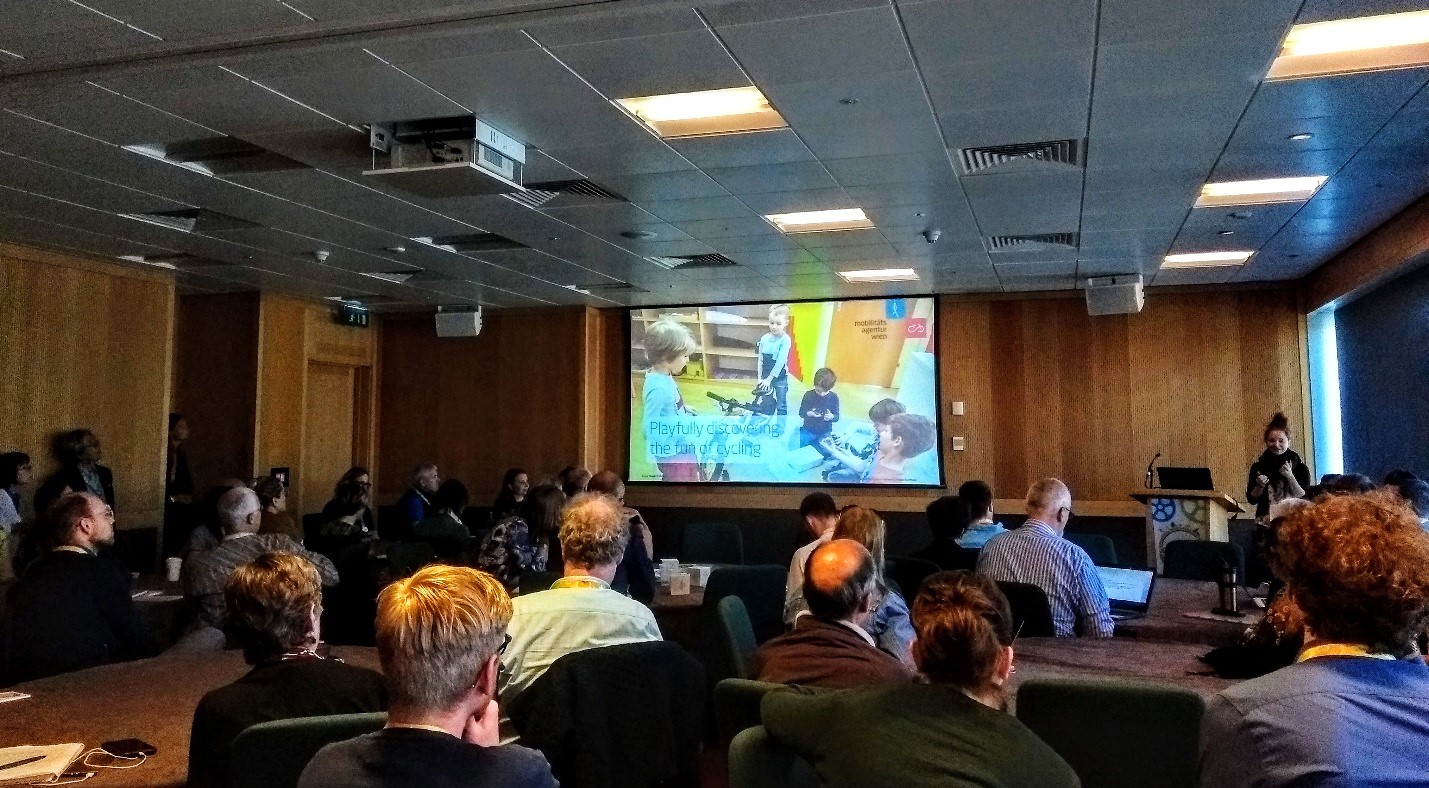
How cycling can and should be an intergenerational mode of transport that is Truly Accessible Everyone
On the third day of Velo-city 2019, participants of the session ‘Cycling for the Ages’ discussed cycling for all human ages – children, teenagers, adults, elderly and everyone in between.
Will Haynes from Sustrans held a presentation about the UK National Cycle Network on how to create infrastructure for all ages.
He explained what makes the network a valuable resource to communities across the UK and how they managed to capture condition data about the network, which they used to inform a series of action plans for improvements.
Following him, Anna Haberl, from the Mobility Agency in Vienna made a presentation about the project ‘The Kindergarten Mobility Box – Promoting cycling as part of healthy mobility at a young age’.
The box contains different materials for playing, experimenting and exercising. Children are encouraged to playfully make their way to kindergarten and experience its surroundings by trying different means of transportation. Some activities place a special focus on getting to know cycling as a fun and easy way of transportation. Various exercises support children’s motor and physical development – in this way, they train basic skills for cycling.
"Children need exercise. Not only does it support a healthy physical development, it is also important for their mental, social and emotional development. Encouraging children to walk to kindergarten or take the balance bike will get them to exercise every day – in addition, they also get used to healthy and active mobility in their daily routine. The sooner children experience walking and cycling in the city, the more likely they will enjoy it as adults.”
Katharina Endes, the sport scientist working for DÉFI VÉLO, talked about the promotion of cycling targeting teenagers, thanks to an innovative project in schools. The idea emerged as a result of statistics showing a very low number of adolescents using bikes in Switzerland.
The project promotes cycling as a quick, desirable and trendy mode of transportation at the critical age where teenagers determine their modal choices. Through a fun and friendly annual competition organized in schools, they help teenagers create a positive image of cycling and to experience its freedom.
Renske Bouwknegt, Service Designer from Ideate, made a presentation on how to reframe bike safety & vitality for elderly and spoke about the creation of Doortrappen programme (CycleOn).
The programme motivates the elderly to continue living a healthy life and enjoying the pleasure of riding their bikes, whilst emphasizing safety measures. Because cycling is such an important part of their daily lives, the CylceOn program collaborates with representatives of local social networks, and connects interventions that promote safety to activities like sports activities and even bridge drives.
Angela Francke, from the Technische Universität Dresden, talked about the challenges for elderly cyclists using mobility diaries and survey data.
The data of two surveys was used to answer this question, analysing them while comparing the age groups. First, a nation-wide online survey was conducted, which aimed for a heterogeneous sample including all types and age groups of cyclists. Survey participants indicated what kind of infrastructure they prefer showing them pictures of typical situations as well as stating how safe or unsafe they would feel in such a situation.
This paper aims to analyse the differences in infrastructure evaluation and cycling safety perception by the different age groups. With these results, further insights can be provided for elderly cyclists to improve conditions and to reduce obstacles that keep them from cycling.
The session ended with Antonio Peña de Marcos, from Alhama High School/Biciclistas De Corella, presenting the emerging lessons from an erasmus+ project on cycling with a focus on social inclusion, intergenerational relationships, and community building.
The collaboration within the project consists of a series of exchange visits while advancing activities such as a special project blog and website, eTwinning activities, signposting and advertising biking trails, bicycle donation campaigns, DIY bike repair workshops.
Network/Project Involved:
Contact the author
Recent news!
Upcoming events
Contact Us
Avenue des Arts, 7-8
Postal address: Rue de la Charité, 22
1210 Brussels, Belgium









